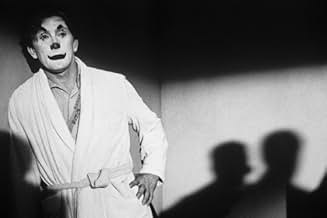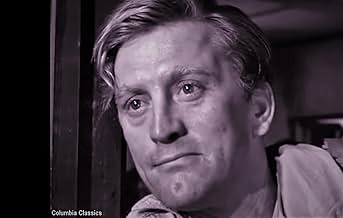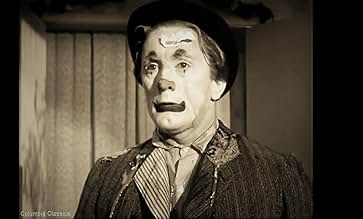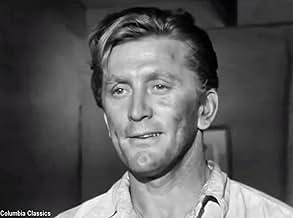En 1949, Hans Muller, antiguo preso de un campo de concentración y natural de Berlín, emigra a Israel, donde, debido a problemas psicológicos, no consigue adaptarse a la vida en tiempos de p... Leer todoEn 1949, Hans Muller, antiguo preso de un campo de concentración y natural de Berlín, emigra a Israel, donde, debido a problemas psicológicos, no consigue adaptarse a la vida en tiempos de paz.En 1949, Hans Muller, antiguo preso de un campo de concentración y natural de Berlín, emigra a Israel, donde, debido a problemas psicológicos, no consigue adaptarse a la vida en tiempos de paz.
- Premios
- 1 premio ganado en total
- Yehoshua Bresler
- (as Joey Walsh)
- Willy Schmidt
- (as Oscar Karlweis)
- Mukhtar
- (escenas eliminadas)
- Hannah
- (sin créditos)
- Refugee
- (sin créditos)
- Papa Sander - Susy's Father
- (sin créditos)
- Bus Driver
- (sin créditos)
- Telephone Girl
- (sin créditos)
- Audience Member
- (sin créditos)
- Mordecai
- (sin créditos)
Opiniones destacadas
In the opening sequence, a group of Jewish refugees are being bussed to their new living encampments in the new state of Israel. The children on the bus are understandably frightened; they're asked questions by uniformed officers who claim they're classifying them for their safety-and this time, they're supposed to believe everything's going to be alright. Kirk calms down a little girl by drawing a face on his hand and distracting her with humor, but he's also frightened. Immediately after the audience is lulled into a sense of security, he approaches a woman with her children who he believes is his long-lost family. He cries and begs her to remember him until his friend whispers in his ear, "Your family is dead, Hans. You've seen the certificate." It's an incredible scene, not only because of Kirk's heart-wrenching performance, but because it shows the audience the post-war emotionality of survivors. How can they possibly relax and trust when they've lived through such horrors and are missing their family and friends?
My one comment on this movie is the uneven storyline. The beginning follows Kirk's introduction to his new home, but when he runs away after a violent run-in with a policeman, he takes up with a young boy, Joey Walsh. He and Joey hike the countryside, often acting as though they haven't a care in the world. Kirk even meets up with the beautiful Milly Vitale and strikes up a romance, but this lighter side is far from the true point of the story. Perhaps the filmmakers felt audiences couldn't handle another hour as heavy as the first twenty minutes, which I understand.
Chances are you've never heard of this movie. I hadn't, and I've seen dozens of Kirk Douglas movies. If you can find a copy, you'll get to see an incredible performance in a groundbreaking drama. It might not be one you'll want to watch over and over again, because it is upsetting, but you'll be very glad you found it. Start looking. You owe it to Kirk Douglas to see this movie.
Unfortunately, Kramer had a habit of assigning George Antheil to score his films. Antheil contributes another inappropriate score heavily accenting any melodramatic moment that points up Kirk's anguish, much the way he did in Kramer's NOT AS A STRANGER. It didn't work there and it doesn't work here, especially during the "escape" scene where the music reaches a frenzied fever pitch of discordant notes.
It's hard to fully sympathize with Douglas' tormented character and that is the film's chief handicap. As the man tracking down the fugitive, PAUL STEWART does his usual workmanlike job. Trouble is, there's an almost documentary feel to the story and its pivotal character is never fully fleshed out, remaining somewhat of an enigma despite Douglas' good performance. When romance comes into the story with the entrance of MILLY VITALE, Douglas' character softens a little under her compassionate care.
Some vivid glimpses of Israel, circa 1949, and good location photography gives the story an authentic air, but the story values are never more than ordinary and the total effect is bland.
Worthwhile mainly for Kirk Douglas fans, it fails to make the impact intended as a serious study of a man haunted by prison camp memories.
** 1/2 (out of 4)
Kirk Douglas plays a Holocaust survivor who is still suffering mental illness after ten years in a concentration camp where he also learned that his wife and children were killed by being put in an oven. After the war Douglas goes to Israel to try and start his life over but his mental condition nearly leads to him killing a cop but he heads off and finds new friends in a closed off community but his past is still looking for him. Edward Dymtryk directed this film, which has its heart in the right place but there are a few major flaws that really kills the film. Needless to say, Douglas gives a very strong and heartbreaking performance and I've heard this is one of his favorites. There's a scene towards the start of the film where he sees a woman with two children and thinks that they are his even though he knows they're really dead. The breakdown Douglas shows in this scene is among the best of his career. There are countless dramatic moments like this one and here lies one of the problems. Douglas gives a strong enough of a performance where the director should have let the acting do the talking but instead of doing that he pumps up the music score. Every time something dramatic happens he pumps up the music score and this here killed most of the drama for me. The film also wants to make the viewer cry every few minutes and this doesn't work either.
¿Sabías que…?
- TriviaThe film is based on author Michael Blankfort's novel with the same title. Initially, producer Stanley Kramer wanted author Blankfort to direct the film but Blankfort was refused a passport for travel to Israel by the United States State Department because Blankfort had been a Communist many years earlier. Kramer reassigned the film to director Edward Dmytryk who served almost a year in prison in 1948 after being convicted of contempt of Congress for refusing to divulge his political affiliations. After his release from prison, Dmytryk moved to England but returned to the U.S. and gave testimony before the House Committee on Un-American Activities and, as a result, was removed from the film industry blacklist.
- Citas
Registration Official at Haifa: Name?
Hans Muller: [softly] Hans Muller
Registration Official at Haifa: You have to speak louder
Hans Muller: HANS MULLER's my name
Registration Official at Haifa: A little softer please. Place of birth?
Hans Muller: Germany... Munich... Beautiful city
Registration Official at Haifa: Occupation before the war?
Hans Muller: You wouldn't believe me
Registration Official at Haifa: I'll believe anything
Hans Muller: I was a juggler.
Registration Official at Haifa: What?
Hans Muller: A juggler
[pantomimes juggling balls in the air]
Registration Official at Haifa: We need a juggler like a hole in the head. What can you do besides throwing things up in the air and catching them?
Hans Muller: My dear sir, to say I throw things up in the air and catch them is like saying Shakespeare just wrote words. Would you care to see my scrapbook?
Registration Official at Haifa: No. Show it when you look for a job... if there are any for jugglers
Hans Muller: I'm retired. I havent thrown up anything but bad food in ten years
Registration Official at Haifa: So what else can you do?
Hans Muller: I can wash dishes, sweep barracks, clean toilets. I can also smile while being beaten by fists, feet, straps and long rubber hoses. I can be used as a guinea pig for new drugs and old poisons. All of which we learned as guests of the Nazis.
- ConexionesFeatured in The Dick Cavett Show: Kirk Douglas (1971)
Selecciones populares
- How long is The Juggler?Con tecnología de Alexa
Detalles
- Tiempo de ejecución1 hora 24 minutos
- Color
- Relación de aspecto
- 1.37 : 1
Contribuir a esta página




































